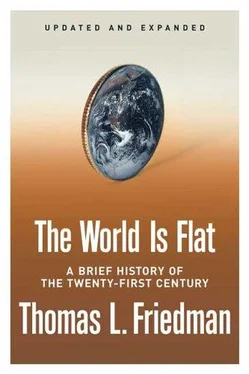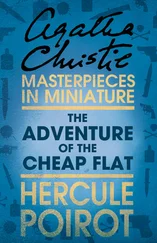One thing George learned from his time in the United States was that without more responsible Indian newspaper... [text was broken here]
When we eventually reached the school complex, though, we found neatly painted buildings, surrounded by some grass and flowers, a total contrast to the nearby hamlets. The first classroom we walked into had twenty untouchable kids at computers working on Excel and Microsoft Word. Next door, another class was practicing typing on a computer typing program. I loudly asked the teacher who was the fastest typist in the class. She pointed to an eight-year-old girl with a smile that could have melted a glacier.
“I want to race you,” I said to her. All her classmates gathered round. I crunched myself into a tiny seat in the computer stall next to her, and we each proceeded to type the same phrase over and over, seeing who could do more in a minute. “Who's winning?” I shouted. Her classmates shouted her name back and cheered her on. I quickly surrendered to her gleeful laugh.
The selection process to get into Shanti Bhavan is based on whether a child is below the poverty line and the parents are willing to send him or her to a boarding school. Shortly before I arrived, the students had taken the California Achievement Tests. “We are giving them English education so they can go anywhere in India and anywhere in the world for higher education,” said Law. “Our goal is to give them a world-class education so they can aspire to careers and professions that would have been totally beyond their reach and have been so for generations... Around here, their names will always give them away as untouchables. But if they go somewhere else, and if they are really polished, with proper education and social graces, they can break this barrier.”
Then they can become my kind of untouchables-young people who one day can be special or specialized or adaptable.
Looking at these kids, George said, “When we talk about the poor, so often it is talk about getting them off the streets or getting them a job, so they don't starve. But we never talk about getting excellence for the poor. My thought was that we can deal with the issue of inequality, if they could break out of all the barriers imposed upon them. If one is successful, they will carry one thousand with them.”
After listening to George, my mind drifted back to only four months earlier, in the fall of 2003, when I had been in the West Bank filming another documentary about the Arab-Israeli conflict. As a part of that project, I went to Ramallah and interviewed three young Palestinian militants who were members of Yasser Arafat's paramilitary Tanzim organization. What was so striking about the interview were the mood swings of these young men from suicidal despair to dreamy aspirations. When I asked one of the three, Mohammed Motev, what was the worst thing about living in the context of Israeli occupation, he said the checkpoints. “When a soldier asks me to take off my clothes in front of the girls. It's a great humiliation to me... to take off my shirt and my pants and turn around and all the girls are standing there.” It is one reason, he said, that all Palestinian young people today are just suicide bombers in waiting. He called them “martyrs in waiting,” while his two friends nodded in assent. They warned me that if Israel tried to kill Yasser Arafat, who was then still alive (and was a leader who knew how to stimulate only memories, not dreams), they would turn the whole area into a living “hell.” To underscore this point, Motev took out his wallet and showed me a picture of Arafat. But what caught my eye was the picture of a young girl next to it.
“Who's that?” I asked. That was his girlfriend, he explained, slightly red-faced. So there was his wallet-Yasser Arafat on one page, whom he was ready to die for, and his girlfriend on the other, whom he wanted to live for. A few minutes later, one of his colleagues, Anas Assaf, became emotional. He was the only one in college, an engineering student at Bir Zeit University near Ramallah. After breathing fire about also being willing to die for Arafat, he began waxing eloquent about how much he wanted to go to the University of Memphis, where his uncle lived, “to study engineering.” Unfortunately, he said, he could not get a visa into the United States now. Like his colleague, Assaf was ready to die for Yasser Arafat, but he wanted to live for the University of Memphis.
These were good young men, not terrorists. But their role models were all angry men, and these young men spent a lot of their time imagining how to unleash their anger, not realizing their potential. Abraham George, by contrast, produced a different context and a different set of teacher role models for those untouchable children in his school, and together they planted in his students the seeds of a very different imagination. We must have more Abraham Georges-everywhere-by the thousands: people who gaze upon a classroom of untouchable kids and not only see the greatness in each of them but, more important, get them to see the greatness in themselves while endowing them with the tools to bring that out.
After our little typing race at the Shanti Bhavan school, I went around the classroom and asked all the children-most of whom had been in school, and out of a life of open sewers, for only three years-what they wanted to be when they grew up. These were eight-year-old Indian kids whose parents were untouchables. It was one of the most moving experiences of my life. Their answers were as follows: “an astronaut,” “a doctor,” “a pediatrician,” “a poetess,” “physics and chemistry,” “a scientist and an astronaut,” “a surgeon,” “a detective,” “an author.”
All dreamers in action-not martyrs in waiting.
Let me close with one last point. My own daughter went off to college in the fall of 2004, and my wife and I dropped her off on a warm September day. The sun was shining. Our daughter was full of excitement. But I can honestly say it was one of the saddest days of my life. And it wasn't just the dad-and-mom-dropping-their-eldest-child-off-at-school thing. No, something else bothered me. It was the sense that I was dropping my daughter off into a world that was so much more dangerous than the one she had been born into. I felt like I could still promise my daughter her bedroom back, but I couldn't promise her the world-not in the carefree way that I had explored it when I was her age. That really bothered me. Still does.
The flattening of the world, as I have tried to demonstrate in this book, has presented us with new opportunities, new challenges, new partners but also, alas, new dangers, particularly as Americans. It is imperative that we find the right balance among all of these. It is imperative that we be the best global citizens that we can be-because in a flat world, if you don't visit a bad neighborhood, it might visit you. And it is imperative that while we remain vigilant to the new threats, we do not let them paralyze us. Most of all, though, it is imperative that we nurture more people with the imaginations of Abraham George and Fadi Ghandour. The more people with the imagination of 11/9, the better chance we have of staving off another 9/11.1 refuse to settle for a world that gets smaller in the wrong sense, in the sense that there are fewer and fewer places an American can go without a second thought and fewer and fewer foreigners feeling comfortable about coming to America.
To put it another way, the two greatest dangers we Americans face are an excess of protectionism-excessive fears of another 9/11 that prompt us to wall ourselves in, in search of personal security-and excessive fears of competing in a world of 11/9 that prompt us to wall ourselves off, in search of economic security. Both would be a disaster for us and for the world. Yes, economic competition in the flat world will be more equal and more intense. We Americans will have to work harder, run faster, and become smarter to make sure we get our share. But let us not underestimate our strengths or the innovation that could explode from the flat world when we really do connect all of the knowledge centers together. On such a flat earth, the most important attribute you can have is creative imagination-the ability to be the first on your block to figure out how all these enabling tools can be put together in new and exciting ways to create products, communities, opportunities, and profits. That has always been America's strength, because America was, and for now still is, the world's greatest dream machine.
Читать дальше












